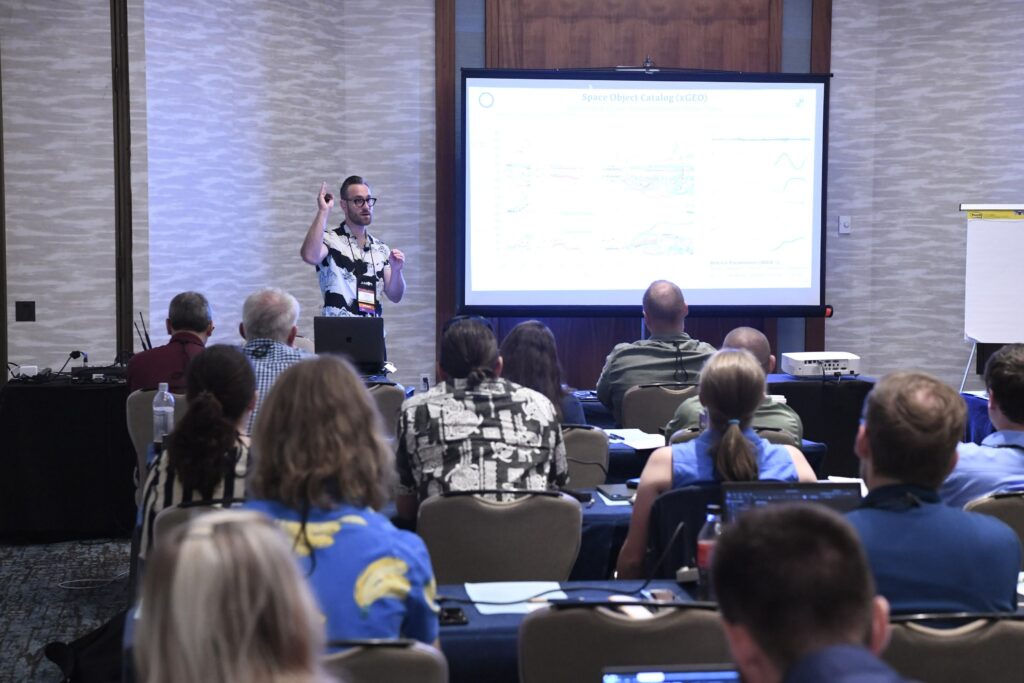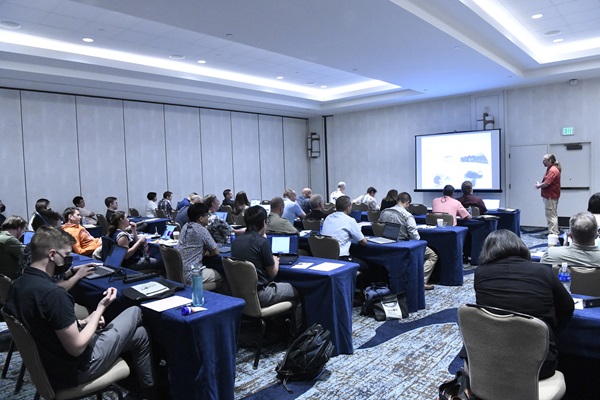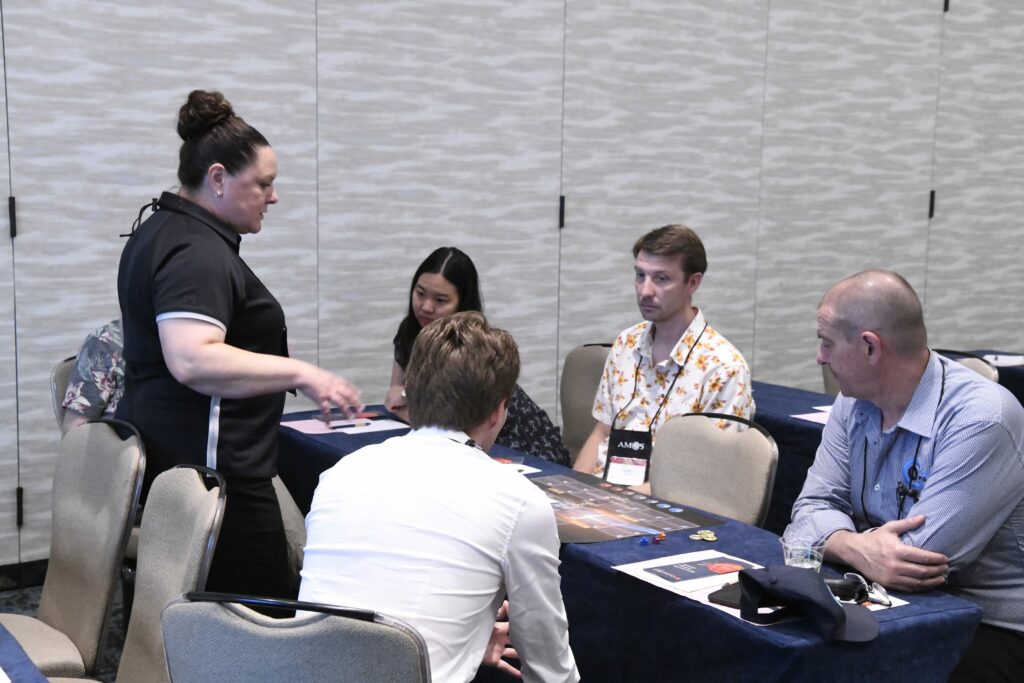Technical Short Courses have been announced for the 2024 AMOS Conference offering attendees opportunities to learn and deepen their understanding of cutting-edge technologies and trends related to space situational/domain awareness (SSA/SDA).
The annual AMOS Conference, presented by Maui Economic Development Board, is celebrating its 25th year. Renowned for bringing together leading experts, researchers, and practitioners from the fields of space domain awareness, courses are offered both in-person on Maui on September 17; or online on September 16. The plenary sessions follow September 18-20 along with networking and exhibit sessions.
“The high number of Short Course proposals we receive reflect the growth in technology, trends and audience.” said Sandy Ryan, Conference Director. “The courses offer opportunities to dive deep into specialized topics, equipping participants with cutting-edge skills and knowledge that drive innovation and excellence in topics related to SDA.”
The short courses cover diverse topics, from conjunction assessment, machine learning and astrodynamics to space law and space environmentalism. By attending these courses, conference participants gain practical insights and skills that contribute to advancements in optical and space surveillance technologies.



In-person courses
Ten short courses will be presented on-site Tuesday, September 19 at the AMOS Conference venue at the Wailea Beach Resort over two sessions. All participation will be in-person with no live streaming available, and no recording. The interactive courses, and the presenters are:
- CA Risk Assessment Technical Short Course – Presented by Francois Laporte, CA senior expert, CNES; Lauri Newman, Conjunction Assessment Program Officer, NASA Headquarters; Matthew Hejduk, Chief Engineer, Satellite Conjunction Assessment, HQ NASA, The Aerospace Corporation
- Astrodynamics for xGEO Space Domain Awareness – Presented by Aaron J. Rosengren, Assistant Professor, University of California San Diego; Shane D. Ross, Professor, Virginia Tech
- Panchromatic, Multi-spectral, Spectroscopy and Polarimetry Data Collection and Image Processing for Non-resolved Object Characterization – Presented by Francis Chun, Professor, USAF Academy, Department of Physics and Meteorology; Timothy Giblin, Senior Scientist, i2 Strategic Services, LLC; David Strong, Senior Scientist, Strong EO Imaging, Inc.; Benjamin Roth, Director, Astronomy Research Group and Observatory, USAF Academy, Department of Physics and Meteorology; Anil Chaudhary, Principal Scientist, Applied Optimization, Inc.; Phillip Fishbein, Computer Engineer/Mathematician, Applied Optimization, Inc.
- Uncertainty Quantification for Space Situational Awareness – Presented by Brandon Jones, Associate Professor, The University of Texas at Austin
- Using a Modular Open System Approach (MOSA) to Enhance Space Situational and Domain Awareness – Presented by Yvette Rodriguez, Research Director / Professor, Defense Acquisition University
- Deep Learning Methods for Space Domain Awareness – Presented by Roberto Furfaro, Professor and Director of Space4 Center, University of Arizona; Richard Linares, Associate Professor, Massachusetts Institude of Technology; Weston Faber, Senior Scientist, L3Harris
- Introduction to Event-Based Sensing for SDA: A Hands-On Tutorial – Presented by Rachel Oliver, Assistant Professor, AFIT; Gregory Cohen, Associate Professor in Neuromorphic Systems, Western Sydney University; Alexandre Marcireau, Postdoctoral Fellow, Western Sydney University; Nicholas Ralph, Postdoctoral Fellow, Western Sydney University
- Observing and Characterizing Space Debris – Presented by Thomas Schildknecht, Director of Swiss Optical Ground Station, University of Bern, Astronomical Institute
- Telescopes and Optics: An Introduction to Ground-based Optical SDA – Presented by Peter Zimmer, Research Scientist
- The Case for Space Environmentalism – Presented by Moriba Jah, Professor Aerospace Engineering & Engineering Mechanics, The University of Texas at Austin
Virtual Courses
Five technical short courses will be presented virtually on Monday September 16. The presentations are “live,” (no recording) and participants will have the ability to interact with the instructor and attendees in real-time.
A. Cross-Domain Learning For Space Law: Challenging the lessons from Maritime, AI and Cyber Domains to Enable a Circular Space Economy – Ralph Dinsley, Founder/Managing Director, 3S Northumbria Ltd; Christopher Newman, Professor of Space Law and Policy, Northumbria University; Lauren Napier, Lecturer In Law, Space, Cyber, Telecommunications, AI and Robotics, Northumbria University
B. Methods of Cognitive Learning for Space Traffic Management – Presented by Mark Abrams, Principal, and Steve Stennett, Principal, Cognitive Learning Systems
C. Astrodynamics Essentials: Mastering the Math and Physics of Space Orbits Simulation – Presented by Richard L. Lachance, President & CEO, RLL Consulting
D. Imaging, Tracking, and Object Detection – Presented by David Gerwe, Scientist, and Steven Griffin, Chief Engineer, Boeing
E. SSA System and Catalog Architecture Design – Presented by Thomas Johnson, CEO, Exa Research, LLC
Full descriptions of all the short courses are available at https://amostech.com/short-courses. A separate registration fee is required for each course and courses can be added to new and existing registrations. Places will be limited due to space and to ensure an interactive experience for all.
Recognized as the preeminent scientific conference in the field of space domain awareness, the AMOS Conference is attended by over 1,000 scientists, engineers and space experts from around the globe and across industry, government, military, and academic sectors. Learn more about the program at https://amostech.com/agenda/
